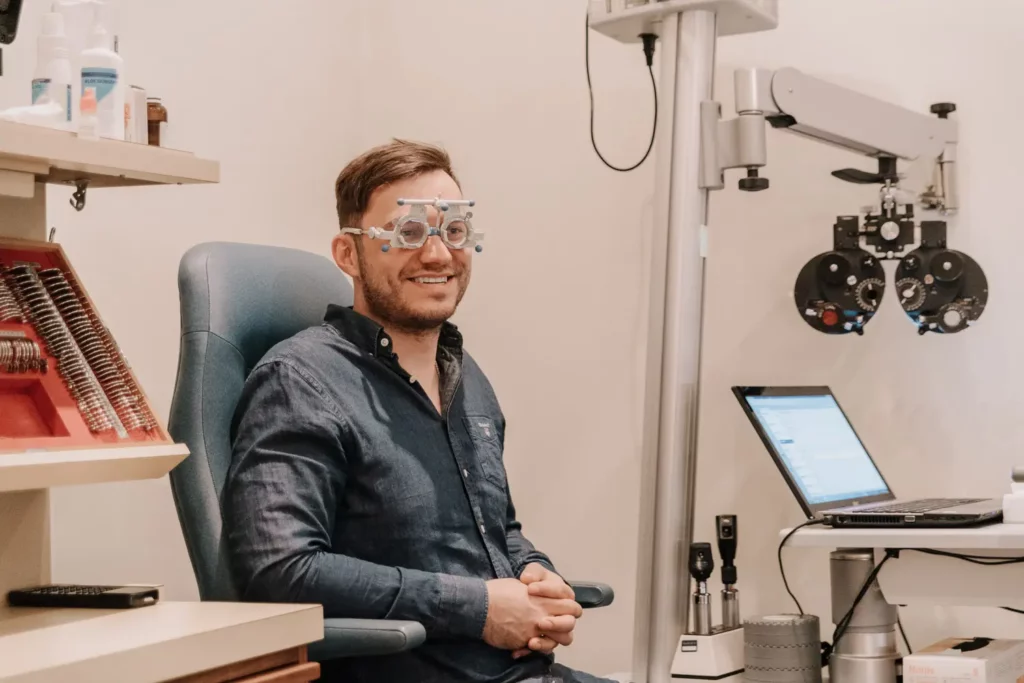Thinking about getting ICL surgery and feeling a bit nervous? Don’t worry, that’s normal! In this post, we’ll discuss how to prepare for surgery, what occurs after surgery, and what you need to do to keep your eyes healthy in the long run.
So, stick around! We promise that by the end of this guide, you’ll feel a lot more ready and less worried about your ICL surgery. Let’s get started!
Contents
What is ICL Surgery?
 ICL surgery, or Implantable Collamer Lens surgery, is like getting contact lenses, but these lenses go inside your eyes instead of sitting on top of them. It’s a type of eye surgery that helps improve your vision if you can’t see things far away clearly, which is known as nearsightedness.
ICL surgery, or Implantable Collamer Lens surgery, is like getting contact lenses, but these lenses go inside your eyes instead of sitting on top of them. It’s a type of eye surgery that helps improve your vision if you can’t see things far away clearly, which is known as nearsightedness.
If your glasses or regular contact lenses aren’t working properly, or if other types of eye surgery aren’t suited for you, this operation may be a good option. During the procedure, a doctor will put a tiny lens inside your eye. This lens helps your eye focus better, and voila, you can see clearly again!
The Before Phase In ICL Surgery
So, what should you expect before getting ICL surgery? Let’s find out.
Before the surgery, you’ll first meet with your eye doctor. This meeting is what we call a consultation. During this consultation, your doctor will do some tests to understand the health of your eyes better.
- Understanding Your Eye Health
The eye surgeon will carefully check your eyes to find out if there are any issues that need to be addressed before the procedure. They will examine for disorders such as glaucoma or cataracts, which might affect the surgery’s success. - Determining the Need for ICL Surgery
Once the doctor has all the information about your eyes, they will decide if ICL surgery is the right choice for you. Not everyone can or should get this surgery. It’s usually suggested for people who have a high degree of nearsightedness, which means they can’t see things clearly that are far away. Or for those who can’t have other types of eye surgeries.
Preparing For ICL Surgery
If the doctor says you’re a good candidate for the surgery, they will then guide you through the next steps to get ready for it.
- Medical Preparations
There might be some things you need to do to prepare your body for the surgery. For example, the doctor might ask you to stop taking certain medicines or start taking new ones.
- Personal Preparations
You also need to make some personal preparations. For example, you’ll need to arrange for someone to drive you home after the surgery because you won’t be able to drive right away. And, make sure you’ve taken enough time off work or school to rest and recover after the surgery.
The After Phase In ICL Surgery
Alright, now that you know what to expect before the surgery, let’s move on to what happens after.
Immediately After the Surgery
Once the surgery is over, you might feel a bit different. Here’s what you can expect.
- Short-term Side Effects
Just after the surgery, your eyes might feel a bit uncomfortable. You may find lights too bright, or things might look blurry. But don’t worry, this is normal and usually goes away after a little while.
- Post-surgery Care
After the surgery, your doctor will give you special instructions on how to take care of your eyes. They’ll give you eye drops to use that help prevent infections and reduce inflammation (that’s when your eyes might get red, warm, and swollen).
Long-term Recovery
Now let’s talk about what to expect in the days, weeks, and months following your surgery.
- Follow-up Appointments
You’ll need to go back to the doctor for follow-up appointments. These visits are very important because they help the doctor see how your eyes are healing and if the surgery was successful.
- Long-term Side Effects
Long-term side effects are not common, but they can happen. Some people might see glares or halos around lights. But don’t worry, most people see a big improvement in their vision after they recover from the surgery.
Do’s and Don’ts After ICL Surgery
Just like with any surgery, there are certain things you should do and some things you should avoid after ICL surgery. Let’s take a look.
Do’s and Don’ts After ICL Surgery
| Do’s | Don’ts |
|---|---|
| Follow your doctor’s instructions for post-surgery care. | Don’t rub your eyes. |
| Protect your eyes with sunglasses when outdoors. | Don’t swim or use a hot tub until cleared by your doctor. |
| Rest and get plenty of sleep to aid in the healing process. | Don’t drive until your doctor gives you the green light. |
| Use prescribed eye drops as instructed by your doctor. | Don’t expose your eyes to dusty or dirty environments. |
| Attend all follow-up appointments for monitoring and care. | Don’t neglect any unusual symptoms or changes in vision. |
These tips can help you recover quickly and avoid complications. But remember, if you have any concerns or if something doesn’t feel right, get in touch with your doctor right away.
Problems After ICL Surgery
 Like any surgery, there can be some problems or complications after ICL surgery. However, these are rare and most people don’t have any issues. Still, it’s good to know about them, just in case.
Like any surgery, there can be some problems or complications after ICL surgery. However, these are rare and most people don’t have any issues. Still, it’s good to know about them, just in case.
- Eye Infection – This is not common, but it can happen. If your eye becomes red, painful, and sensitive to light, or if your vision gets worse, you might have an infection. If this happens, you should contact your doctor right away.
- Increased Eye Pressure – Some people might experience an increase in eye pressure after surgery. Your doctor will check for this during your follow-up appointments. If it happens, you might need to take eye drops or other medication.
- Cataract Development – In rare cases, ICL surgery can speed up the development of cataracts (when the lens in your eye becomes cloudy). If this happens, cataract surgery can usually fix the problem.
- Problems with the Lens – Sometimes, the implanted lens can move out of place, or your eye might have trouble adjusting to it. If this happens, you might need another surgery to fix it.
Remember, most people have no problems after ICL surgery, and they’re happy with the improvement in their vision. But if you have any concerns or notice anything unusual, don’t hesitate to contact your doctor.
Conclusion
There you have it! We’ve walked you through the journey of ICL surgery, explaining what to expect before, during, and after the procedure. From initial consultations to potential post-surgery problems, we hope this comprehensive guide has left you feeling more informed and less anxious.
Remember, while there may be potential complications, ICL surgery is a proven and effective way to improve your vision. Just like thousands of others who’ve undergone the procedure, you too can look forward to a life with clearer vision, free from the constraints of glasses or contact lenses.
It is a simple procedure offered by EyeMantra. We are proud to provide the most advanced options including PRK, Femto Lasik, SMILE surgery, Standard Lasik, ICL, and Contoura vision. If you have any questions on Lasik surgery in Delhi, Lasik surgery cost, and Lasik procedure, call us at 9711116605 or email at [email protected].



You actually make it appear so easy with your presentation but I to find this topic to be actually something that I feel I might never understand.
It sort of feels too complicated and very vast for me. I’m taking a look forward for your next post, I will try to get the hang of it!
Najlepsze escape roomy